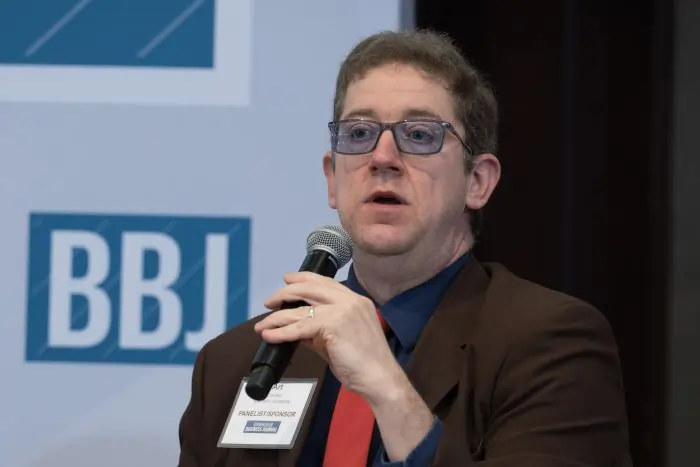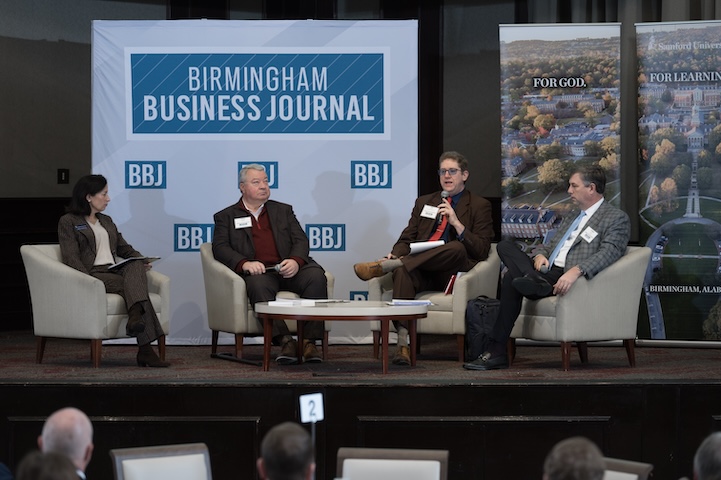
Brock School of Business professor Art Carden, a leading researcher on macroeconomics and three-time author, praised the Trump Administration’s push for deregulation but warned against overutilizing tariffs. Carden shared his expert opinions during the “Economic Forecast 2025” panel co-hosted by Samford University and the Birmingham Business Journal.
Betsy Bugg Holloway, Samford’s vice president for advancement and marketing, emceed the panel, which also featured Greg Canfield, former Secretary of Commerce for the State of Alabama, and Chris Abele, executive director of middle market banking for Synovus.
“Loosening restrictions in the energy industry is an important part of deregulation. Climate change is real, and climate change could be bad, but I think climate change may cost us a couple of percentage points of GDP in 100 years,” Carden said. “It’s not a cataclysmic existential threat to humanity. Lower energy prices will mean greater economic growth. I’m especially bullish on lowering the regulatory burden.”
Carden said the Trump administration has “the power and potential to do something genuinely good” for the U.S. economy, applauding the nomination of professor Casey Mulligan to head the Small Business Administration.
However, Carden sounded wary about trade tariffs driving nativist policy.
“Economists for the last 250 years have been explaining again and again and again that restrictions on international trade make us poorer. Full stop,” he said. “There are sophisticated arguments to be made in favor of strategic tariffs or revenue tariffs. Trump is not making any of those arguments.”
A senior fellow with the American Institute for Economic Research and the Fraser Institute, Carden said the U.S. runs the risk of repeating “the same set of mistakes we seem to insist upon repeating with every presidential administration.”
MORE: Professor Art Carden gains international recognition
On a regional level, Carden encouraged Birmingham leaders to avoid mistakes made by cities like Atlanta, Chicago, New York, San Francisco and Boston, to “embrace the prosperity that these other places are forsaking” by eliminating land-use restrictions that can distort housing markets and complicate business start-ups.
“Birmingham has an opportunity to capitalize on everybody else’s mistakes by stepping back and saying, ‘We're no longer going to require you to get permission to do something cool, to do something interesting, to do something innovative,’” he said. “One of the things that ultimately would do is, presumably, drive an increase in labor force participation by reducing the barriers on the demand side for labor and on the supply side for housing. Birmingham can offer low land prices, low housing prices, and an environment where you can try basically anything you want to do.”
Provost Dave Cimbora, during opening remarks to corporate leaders in the audience, said Samford’s professionally trailed alumni enhance the regional workforce.
“We have 75% of our students who hail from places outside of Alabama, and the fun part is a very large percentage of those end up staying in Alabama. So we like to consider Sanford as a net contributor to talent in the region,” Cimbora said.
“This is where you all have come in. Some of you have taken our students under your wings in terms of your enterprises and industry, and we thank you for that.”
GIVE: Support scholarships for students within the Brock School of Business

From left, Betsy Bugg Holloway, Greg Canfield, Art Carden and Chris Abele formed the panel at "Economic Forecast 2025."
